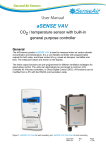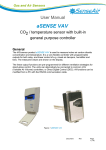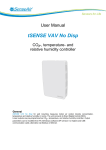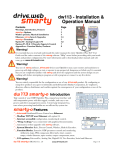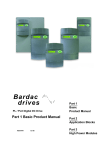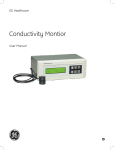Download aSENSE MIII User Manual
Transcript
aSENSE mIII CO2 / CO sensor with built-in general purpose controller General The IAQ-sensor product aSENSE mIII is used to measure indoor air carbon dioxide and carbon monoxide concentrations. It is a very flexible controller with programmable outputs for both relay- and linear control of e.g. mixed air dampers, humidifier and fans. The measured values are shown on the display. The unit can alternatively be connected to common VAV (Variable Air Volume) controllers, or Direct Digital Control (DDC). The linear output functions are preprogrammed. All functions can be modified from a PC with the software UIP (version 4.3 or higher) and the RS232 communication cable. Figure 1 aSENSE mIII for wall mounting and ventilation duct mounting Document UMA 132 Rev 3 Page 1 (16) FUNCTIONAL DESCRIPTION aSENSE mIII is delivered pre-programmed (see description below). With the free software UIP4.3 (or later versions) and SenseAir’s standard communication cable for PC, A232 Cable, the user can adjust the product to his/hers application by, for example, changing the measurement ranges of the linear outputs, modify the set points of the alarm outputs, invert outputs and also reconfigure the functions and the logic that controls the outputs. OUT1 = CO Start point OUT2 = CO2 OUT3 = Gas alarm relay OUT4 = Sum alarm Figure 2 Print screen of UIP4.3 PC work space of aSENSE mIII where the preset functions can easily be redefined. The four outputs (far right) are here arranged in rows together with the function blocks that control the output. CO (ppm) 100,0 CO2(ppm) 1 300 CO (ppm) CO2(ppm) 90,0 1 200 80,0 1 100 70,0 1 000 60,0 900 50,0 800 40,0 700 30,0 600 20,0 500 10,0 400 12:00 08:00 04:00 00:00 20:00 16:00 12:00 08:00 04:00 00:00 20:00 16:00 12:00 08:00 04:00 00:00 20:00 16:00 12:00 08:00 04:00 00:00 20:00 16:00 12:00 08:00 04:00 00:00 20:00 16:00 12:00 08:00 04:00 00:00 20:00 16:00 12:00 08:00 04:00 00:00 20:00 300 16:00 - Internal CO and CO2 recorder samples data continuously every 20 minutes. After 13 days and 8 hours the storage memory is full and the oldest data are eventually overwritten one by one. The data storage is secured every four hours. In case of power failure the sampled data of the latest four hours at most will be lost. The other values can be studied with the software UIP4.3 and exported to a text file for further treatment in e.g. MSEXCEL Figure 3 Recorded readings Document UMA 132 Rev 3 Page 2 (16) Standard configuration: Out(1) is carbon monoxide output, Out(2) is carbon dioxide output and Out(3) is relay output. Out(4) is error status OR Out(3) is open. Out(1) = measuring signal for carbon monoxide concentration Out(2) = measuring signal for carbon dioxide concentration Out(3) = ON/OFF of demand of air quality. The relay is open in alarm situations and at power loss. NOTE! There is a two minutes delay after start-up. Out(4) = error status OR Out(3) open, carbon monoxide concentration > 35 ppm OR carbon dioxide concentration > 1500 ppm. There is a two minutes delay after startup. Figure 4 The control signal of air quality # in figure 4 1 Terminal ~ + Standard configuration Power (+) Standard settings 24 VAC/DC+ (+-20%), 3W Standard function 2W without output load Power ground (-) 24 VAC/DC- The same ground reference has to be used for the aSENSE mIII unit and for the control system! Out(1) 0-10VDC 0-100 ppm CO Measuring signal carbon monoxide 4 Out(2) 0-10VDC 0-2000 ppm CO2 Measuring signal carbon dioxide 5 Unmarked Signal Ground (-) Connected to G0 via PTC fuse 6 Relay Air control Delay two minutes after start. 2 3 7 8 Closed Out(4) Open collector < 30 ppm CO < 1400 ppm CO2 Open > 35 ppm CO > 1500 ppm CO2 Open No error detected AND normal gas concentrations Closed Error detected OR high gas concentrations The green LED is lit The relay is open in alarm situations and at power loss. The red LED is lit and the green is not lit. Error status Delay two minutes after start. The red LED is lit if an error OR high gas concentrations are detected. If an error is detected also the yellow LED is lit Document UMA 132 Rev 3 Page 3 (16) Table I. Default configuration of aSENSE mIII. Output Configurations A label on the inner side of the sensor lid shows the configuration of the outputs at the time of product delivery. The sensors/controllers are supplied from the factory (unless otherwise ordered) with 0...10VDC linear outputs for Out(1) and Out(2). Out(4) is an open collector output (see Table II). If different output configurations are needed for the application, these have to be reconfigured before the unit is powered up. Default values are 0-10 V. ~ + DI1 DI1 Switch for alarm test Jumper for configuring the linear output start point to 0% or 20% start point Jumper to choose communication protocol Jumpers to choose between voltage or current outputs Jumper to choose between open collector or 0-10V linear signal Figure 5 The connection terminal area of the aSENSE mIII with jumpers and terminals. The terminal DI1 may be used for forced ventilation. If the sensor has a heater it is connected to Document UMA 132 ~ + and Rev 3 . Page 4 (16) Jumper Start point selection jumper Communication selection jumper Position Function 0% Jumper top position provides 0Vdc or 0mA start point for Out(1), Out(2) (0-20mA or 0-10V). 20% Jumper bottom position provides 2Vdc or 4mA start point for Out(1), Out(2) (4-20mA or 2-10V). MB Modbus communication protocol SA SenseAir communication protocol Current Connection in position “Current” provides 0/4-20mA output range for Out(1). Voltage Connection in position “Voltage” provides 0/2-10VDC output range for Out(1). Current Connection in position “Current” provides 0/4-20mA output range for Out(2). Voltage Connection in position “Voltage” provides 0/2-10VDC output range for Out(2). Voltage Connection in position “Voltage” provides 0-10VDC for Out(4). Out(1) Out(2) Out(4) Open Connection in position “Open collector” provides an open collector output. collector Max 0,5A, 55VDC / 40VAC (half-wave rectifier). Table II. Configuration jumpers for aSENSE mIII Option - Network Adapter for Connection to RS-485-Network The network adapter can be used to connect the SenseAir sensor to a RS-485network. The adapter is a small printed circuit board which can be used with all sensors with the housings large enough. The green LED flashes every time the adapter answers calls from the network master. The adapter should be mounted perpendicular to the main PCB. The adapter should be put on the UART connector with all five pins connected. All five pins of the UART must be connected. For aSENSE the adapter should be mounted with the RS-485 terminal facing the other terminals and the LED facing the display. Document UMA 132 Rev 3 Page 5 (16) Push Button Operation for aSENSE mIII This sensor has two push buttons, MENU and ESC. The YELLOW LED will acknowledge a successful push by a short flash. The push button MENU is available for selection of display value or maintenance commands, whereas ESC is available to escape back from a selected level. MENU MENU ESC Figure 6 The sensor with push buttons ESC Figure 7 The push button MENU is pushed MENU MENU ESC Figure 8 The push button ESC is pushed ESC Figure 9 The ENTER command is done by pushing buttons MENU and ESC at the same time for about 14 seconds Display modes In DISPLAY MODE the DEFAULT operation is that the sensor alternates between carbon dioxide and carbon monoxide readings presentation. The push button MENU(+) is used to select the indicated value on the display to be the error code or Document UMA 132 Rev 3 Page 6 (16) the set points of temperature and CO2 After power up the display will always return to the Default display mode. If a permanent change of default values is requested the PC software is to be used. Function Display Line Time limit Function description 0 CO / CO2 no DEFAULT - Normal operation 1 Exxx yes Error code. If no error has been detected the code E0 is shown. The error code is reset with Entr(+-). 2 Present CO and CO2. set points no Toggle between display of temperature and CO2 set point with MENU(+). Table III. On the display without entering the maintenance menu Maintenance level A number of execution options are available from the MAINTENANCE MENU (see Table IV). This level is accessed only from the display mode in the set points of CO and CO2 selection. A two buttons push and an access code restrict access, intended for competent trained service personnel only. The Entr(+-)command is done by PUSHING MENU AND ESC AT THE SAME TIME (hold down for about 14 seconds). The access code has eight binary digits; one press at MENU(+) equals 1 and one press at ESC(-) equals 0. The code value can be changed for your personal choice from the software UIP 4.3. Always use the ESC button to return to the DEFAULT mode. Several pushes of the ESC button may be needed to return to the DEFAULT mode. The Entr(+-) push (MENU & ESC) eventually leads to execution of functions, which causes temporary or permanently change of any parameter, that affects the system outputs! Function Line Display Time Function description limit Access code to the service menu The default value of the code is 255 (=11111111, that is eight presses on MENU(+)). Press down MENU(+) and let it scroll until it stops. The last two digits of the code are shown. Then ENTER to accept the selected code. For setting the set point of the CO concentration. For increase / decrease of the CO set point. The set point is increased by stepping with MENU(+) button. Decreasing is done by stepping with the ESC(-) button. For setting the set point of the CO2 concentration 3 ECxx yes 4a SPCO yes 4b The present CO set point yes 5a SPc yes 5b The present CO2 set point yes For increase / decrease of the CO2-concentration set point The set point is increased by stepping with MENU(+) button. Decreasing is done by stepping with the ESC(-) button. 6a 6b AOUt An xx yes no First step of adjusting the analogue outputs MAX and MIN values Select analogue output by stepping with MENU(+) button 6c1 SetL no Leads to adjustment of the MIN value. Document UMA 132 Rev 3 Page 7 (16) 6d1 The present MIN value in % of FS no Increase the MIN value by stepping with the MENU(+) button. Decrease by stepping with the ESC(-) button. The output is set to the MIN value and can be checked with a multimeter. 6e1 Sure no The adjustment is saved by pressing Entr(+-). Press ESC to return without saving. 6c2 SetH no Leads to adjustment of the MAX value 6d2 The present MAX value in % of FS no Increase MAX value by stepping with the MENU(+) button. Decrease by stepping with the ESC(-) button. The output is set to the MAX value and can be checked with a multimeter. 6e2 Sure no 7 CALb yes 7a Sure yes Confirm that a background calibration shall be done. 8 CAL yes Zero point calibration of the CO sensor and the CO2 sensor. The sensor needs zero gas. See the zero point calibration instruction. The calibration must be confirmed by pressing Entr(+-). 8a Sure yes Confirm that a zero point calibration shall be done. The adjustment is saved by pressing Entr(+-). Press ESC to return without saving. Background calibration of the CO sensor and the CO 2-sensor with fresh air. An easy way to correct the zero point error. The sensor needs fresh air (380-420 ppm CO2). The calibration must be confirmed by pressing Entr(+-). The CO2 sensor is calibrated to 400 ppm CO2 and the CO sensor to 0 ppm CO. Table IV. Maintenance functions available on aSENSE mIII to set output limits. Time limit refers to an internal time-out that returns the LCD and maintenance function back to normal. ENTER is a simultaneous pressing on MENU and ESC. PLEASE NOTE! If a power failure happens when the sensor has Out(1)...(4) locked to min/max limits, then the sensor will have this output locked when the power returns. It is necessary to enter this menu item and release the output manually! Document UMA 132 Rev 3 Page 8 (16) EXAMPLE I: Setting of the MAX value of the analogue outputs The access code is time limited. If the time limit is exceeded the sensor returns to DEFAULT. ENTR =MENU(+) and ESC(-) are pushed simultaneously. 1. At the start of the setting the sensor is in DEFAULT. 2. Push MENU(+) once to reach the error code. The display shows E + the error code number. No error is shown as E000. 3. Push MENU(+) once. The display shows the CO set point e.g. 35. 4. Push ENTR(+-) once. The display shows EC and two digits. Enter the access code to the service menu. If the default code is used do like this: Push MENU(+) until the digits stop. The display shows EC55. If the correct code is not entered before the time limit exceeds the sensor returns to DEFAULT. 5. Push ENTR(+-) once. The display shows SPCO to set the CO set point. 6. Push MENU(+) once to reach the carbon dioxide set point. The display shows SP C. 7. Push MENU(+) once to reach the setting of analogue outputs. The display shows AOUt. 8. Push ENTR(+-) to reach the output to be set. The display shows An and two digits e.g. An 01. Step to the requested output by pushing MENU(+). 9. Push ENTR(+-) to reach the setting of the MIN value. The display shows Set L. 10. Push MENU(+) to reach the setting of the MAX value. The display shows Set H. 11. Push ENTR(+-) to set the MAX value of the output. The display shows the numerical value in % e.g. the standard setting100.0 % or previously set value. Push MENU(+) to increase the MAX value. Push ESC(-) to decrease the MAX value. Push ENTR(+-). The display shows Sure. Push ENTR(+-) to save the setting and return to Set H. Push MENU(+) or ESC(-) to return to Set H without saving the new setting. Push ESC(-) to return to the output to be set, item 12. Push ESC(-) once again to return to the setting of analogue outputs item 11. Document UMA 132 Rev 3 Page 9 (16) Figure 10 Maintenance functions available on aSENSE mIII to set output limits. Only flow chart for setting High limits is shown, but Low limits are set in the very same way. The numbers in the flow chart refers to the points in example 1. Function blocks that are time limited are indicated by blue boarders. Time limit refers to an internal time-out that returns the LCD and maintenance function back to normal. ENTER is a simultaneous pressing on MENU and ESC. EXAMPLE II: Setting of set points for carbon monoxide concentration and carbon dioxide concentration, the MAX and MIN values of the analogue outputs and calibration of the sensor The access code and the recalibration of the sensor are time limited. If the time limit is exceeded the sensor returns to DEFAULT. ENTR =MENU(+) and ESC(-) are pushed simultaneously. 1. At the start of the setting the sensor is in DEFAULT. 2. Push MENU(+) once to reach the error code. The display shows E + the error code number. No error is shown as E000. (Push ESC(-) to return to DEFAULT if requested 3. Push MENU(+) once. The display shows the CO set point e.g. 35 ppm and the carbon dioxide set point e.g. 750ppm. Document UMA 132 Rev 3 Page 10 (16) (Push ESC(-) to return to DEFAULT if requested.) 4. Push ENTR(+-) once. The display shows EC and two digits. Enter the access code to the service menu. If the default code is used do like this: Push MENU(+) until the digits stop. The display shows EC55. If the correct code is not entered before the time limit exceeds the sensor returns to DEFAULT. 5. Push ENTR(+-) once. The display shows SPCO to set the carbon monoxide set point. 6. Push ENTR(+-) once. The display shows the carbon monoxide set point e.g. ex 35 ppm. Push MENU(+) to increase the set point value in steps of 1 ppm. Push ESC(-) to decrease the set point value in steps of 1 ppm. 7. Push ENTR(+-) once when the set point is set. The display shows SPCO. Push ESC(-) to return to DEFAULT. 8. Push MENU(+) once to reach the carbon dioxide set point. The display shows SP C. 9. Push ENTR(+-) once. The display shows the carbon dioxide set point e.g. 750 ppm. Push MENU(+) to increase the set point value in steps of 50 ppm. Push ESC(-) to decrease the set point value in steps of 50 ppm. 10. Push ENTR(+-) once when the set point is set. The display shows SP C. Push ESC(-) to return to DEFAULT. 11. Push MENU(+) once to reach the setting of analogue outputs. The display shows AOUt. 12. Push ENTR(+-) to reach the output to be set. The display shows An and two digits e.g. An 01. Step to the requested output by pushing MENU(+). 13. Push ENTR(+-) to reach the setting of the MIN value. The display shows Set L. 14. Push ENTR(+-) to set the MIN value of the output. The display shows the numerical value in % e.g. the standard setting 0.0 % or previously set value. Push MENU(+) to increase the MIN value. Push ESC(-) to decrease the MIN value. Push ENTR(+-). The display shows Sure. Push ENTR(+-) to save the setting and return to Set L. Push MENU(+) or ESC(-) to return to Set L without saving the new setting. 15. Push MENU(+) to reach the setting of the MAX value. The display shows Set H. 16. Push ENTR(+-) to set the MAX value of the output. The display shows the numerical value in % e.g. the standard setting 100.0 % or previously set value. Push MENU(+) to increase the MAX value. Push ESC(-) to decrease the MAX Document UMA 132 Rev 3 Page 11 (16) value. Push ENTR(+-). The display shows Sure. Push ENTR(+-) to save the setting and return to Set H. Push MENU(+) or ESC(-) to return to Set H without saving the new setting. Push ESC(-) to return to the output to be set, item 12. Push ESC(-) once again to return to the setting of analogue outputs item 11. 17. Push MENU(+) to reach the calibration with fresh air. The sensor needs fresh air, air with 400 ppm carbon dioxide. The display shows CALb. Push ENTR(+). The display shows Sure. Push ENTR(+-) to confirm that a background calibration should be done. After completed background calibration the sensor returns to DEFAULT. If a background calibration should not be executed push MENU(+) or ESC(-). The background calibration has a time limit. 18. Push MENU(+) to reach the zero point calibration. The sensor needs carbon dioxide free air or gas. . The display shows CAL. Push ENTR(+-). The display shows Sure. Push ENTR(+-) to confirm that a zero point calibration should be done. After completed zero point calibration the sensor returns to DEFAULT. If a zero point calibration should not be executed push MENU(+) or ESC(-). The zero point calibration has a time limit. FUNCTIONAL TEST of CO2 / CO sensor aSENSE mIII Functional test The unit has three LED’s – green, yellow and red. These LED’s indicate the status of the controller. An internal delay function prevents the alarm functions of the relay and OUT4 output during two minutes after power up. The alarm outputs may be tested after the two minutes delay Green LED - ”No alarm situation” is lit, when the relay is contact closed. Yellow LED - ”Call for maintenance” is lit, if an error flag is set or the measurement is out of range. This information is also shown on the display by the wrench icon. Any push button press, or executed maintenance function, is acknowledged by emission from this LED. If an error has been detected both the yellow and red LEDs are lit. Red LED - ”Alarm high gas concentrations” is lit, when the open collector output is activated (contact closed). The CO concentration is 35 ppm or more OR the CO 2 concentration is 1500 ppm or more OR if the yellow LED is lit. A simple and visual functional test can easily be performed. Take a breath and blow the air from a distance of a few centimetres on the sensor. The sensor will detect a rapid increase in the carbon dioxide concentration. The red LED is lit and the green LED is turned off when the CO or CO2 concentration goes above the pre-set value. If the sensor is connected to a controller, the flow of the ventilation system will eventually increase by change of the fan speed or opening of a damper actuator (depending on the installation/application). Document UMA 132 Rev 3 Page 12 (16) Test gas verification If the measurement of a sensor is to be verified, a test gas with carefully determined concentration of CO and CO2 must be used. For zero calibration pure nitrogen or air that has passed through a chemical absorber should be used. In fresh air the carbon monoxide concentration is nearly zero. The Zero calibration kit can be used to produce carbon dioxide free air. Check the CO and CO2 values of the display or the voltage of the output 1 for CO and the voltage of the output 2 for CO2 with a multimeter when the values have stabilized. When a zero calibration shall be executed a plastic tube with 2.2 mm outer diameter and 0,8 mm inner diameter shall be inserted in marked holes of the sensor. Plastic tubing is connected to the tube. The gas flow should be between 0.3 and 1.0 l/min. The yellow LED flashes when a calibration is executed .A calibration will only be executed if the gas concentration is stable. If the yellow LED does not flash after 8 seconds no calibration has been executed. Then try to do another calibration. Marking CALb CO2 CAL CO Function Background calibration = CO2 sensor calibration with fresh air. An easy way to correct the zero point error. The sensor needs fresh air (380-420 ppm CO2). The CO2 sensor is calibrated to 400 ppm CO2. Zero point calibration of the CO sensor with fresh air. The CO sensor is calibrated to 0 ppm CO Gas inlet CO2 MENU ESC MENU Gas inlet CO2 ESC Figure 11 The PCB with the calibration jumper in default position. An enlarged part of the PCB with marked gas inlets and jumper positions for calibration is shown at right. Document UMA 132 Rev 3 Page 13 (16) PLEASE NOTE! The sensor accuracy is defined at continuous operation (at least 3 weeks after installation) Self-diagnostics The system contains complete self-diagnostic procedures. A full system test is executed automatically every time the power is turned on. For aSENSE mIII the internal voltage regulators and outputs are checked. In addition, constantly during operation, checking the valid dynamic measurement ranges checks the sensor probes against failure. These different system checks return error bytes to the system RAM. If any error is detected, the yellow LED will be lit until the error has vanished and the error flag is reset. “Warm up” and “Out of Range” are the only bits that are reset automatically after return to normal state. All other error bits have to be reset manually after return to normal state – either by pushing MENU & ESC buttons simultaneously for (=Entr(+-) or by power off and restart. By pushing the push button ”MENU” the error code number Exxx is shown on the LCD. Descriptions of the different codes are listed below. Error code and action plan Bit # Error code 0 N/A 1 2 2 4 3 8 4 16 5 32 6 64 7 128 Error description Fatal Error Yellow LED continuously flashes. Push buttons are not operating. Reserved Algorithm Error. Indicate wrong EEPROM configuration. Output Error Detected errors during output signals calculation and generation. Self-Diagnostic Error. May indicate the need of zero calibration or sensor replacement. Out of Range Error Accompanies most of other errors. Can also indicate overload or failures of sensors and inputs. Resets automatically after source of error disappearance. Memory Error Non-fatal error during memory operations. Warm Up state Is always set after power up or power failure. Resets after restart sequence Suggested action Try to restart sensor by power OFF/ON. Contact local distributor Try to restart sensor by power OFF/ON. Check detailed settings and configuration with UIP software version 4.3 and higher. Contact local distributor Check connections and loads of outputs. Check detailed status of outputs with UIP software version 4.3 and higher. Check detailed self-diagnostic status with UIP software version 4.3 and higher. Contact local distributor Try sensor in fresh air. Check connections of temperature and relative humidity probe. Check detailed status of measurements with UIP software version 4.3 and higher. See Note 1! Check detailed settings and configuration with UIP software version 4.3 and higher. If it doesn’t disappear in half a minute, check power stability. Table V. Error codes Document UMA 132 Rev 3 Page 14 (16) Note 1. Any probe is out of range. Occurs, for instance, during over exposure of CO 2 sensor, in which case the error code will automatically reset when the measurement values return to normal. Could also indicate the need of zero point calibration. A background calibration using push button function ”bCAL” will cure this error (a more exact zero calibration using ”CAL” may be performed later, if required). If the CO2 readings are normal, and still the error code remains, the temperature or relative humidity sensor can be defect or the connections to these are broken. Please remark: If several errors are detected at the same time the different error code numbers will be added together into one single error code! Maintenance The aSENSE mIII is basically maintenance free. An internal self-adjusting calibration function takes care of normal long term drift associated to the CO and CO 2 sensor. To secure the highest accuracy, a time interval of five years is recommended between calibrations, unless some special situations have occurred. A zero calibration can be performed by use of the push button functions, or for a complete overview by use of a PC together with the UIP software version 4.3 (or higher). This software can be free downloaded from www.senseair.com. A RS232-cable is needed and can be ordered from SenseAir. The cable is to be connected to the UART port slide connector (Fig 10). For change of control parameters and re-calibration (CO2 and CO) this PC tool has to be used. The check can be done on site without interfering with the ventilation system. ~ + DI1 Figure 12. The aSENSE mIII printed circuit board with the connection terminal area is enlarged. The terminal DI1 may be used for forced ventilation. If the sensor has a heater it is connected to . Document UMA 132 Rev 3 ~ + and Page 15 (16) This product is in accordance with the EMC 2004/108/EC, 92/31/EEG including amendments by the CE-marking Directive 93/68/EEC The product fulfils the following demands: EN 61000-4-2 level 2, EN 61000-4-3 level 2, EN 61000-4-4 level 4, EN 61000-4-6, EN 61000-4-8 level 4, EN 55022 class B Contact SenseAir® AB Europe Box 96 Stationsgatan 12 SE- 82060 Delsbo Sweden SenseAir® North America 29030 SW Town Center Loop East Suite 202 #169 Wilsonville, OR 97070 USA SenseAir® Asia SenseAir® Chengdu Gas Sensors Ltd. First floor of 8th of Xingke South Road Jiniu High-Tech, Industrial Park 610036, Chengdu China Phone: +46 (0) 653 - 71 77 70 E-mail: [email protected] Web site: senseair.com Phone: +1 (520) 349-7686 E-mail: [email protected] Web site: senseair.com Phone: +86 - 028 875 928 85 E-mail: [email protected] Web site: senseair.asia Document UMA 132 Rev 3 Page 16 (16)
















